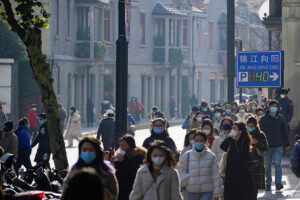TOKYO – Policymakers in Tokyo believe China’s deepening economic woes could hit Japan’s fragile recovery, especially if Beijing fails to shore up demand with meaningful stimulus, potentially delaying an exit from ultra-loose monetary policy.
China’s downturn would leave Japan’s export-reliant economy with little external support as aggressive Federal Reserve interest rate hikes cool growth in the United States, another key driver of global activity.
The risks from China will be among key topics of debate at the Bank of Japan’s September policy meeting, say five sources familiar with the bank’s thinking, and raise fresh questions about Governor Kazuo Ueda’s efforts to wean the economy off the massive monetary stimulus of the past decade.
“What’s happening in China is worrying and could deal a huge blow to Japan’s economy,” said one of the sources, who spoke on condition of anonymity due to the sensitivity of the matter.
“A downturn in China may diminish the chance of Japan achieving sustained wage growth,” which is a crucial condition for phasing out monetary stimulus, another source said.
In a sign of growing pessimism over China, the government also said its monthly economic report for August that “concern over China’s outlook” was among risks to Japan’s recovery.
“China is over,” a senior Japanese government official told Reuters on condition of anonymity because of sensitivity of the issue. “I think China will never return to 5% growth.”
Having taken steps in July to make its ultra-loose policy sustainable, the BOJ is widely expected to keep monetary settings unchanged at its Sept. 21-22 meeting.
NEW RISKS
While many Japanese policymakers expect China to avert a hard-landing, thanks in some part to Beijing’s recent support measures, the stakes for Japan are high.
China is Japan’s largest trading partner, accounting for 20% of its exports, having replaced the United States in 2020. Exports to China fell 8.6% in the first half of this year as demand for cars, steel and electronics wilted.
Economists believe China’s downturn could knock 1-2 percentage points off Japan’s annual growth, fueling fears of a prolonged slowdown in Asia’s two biggest economies, which combined account for about a fifth of global gross domestic product.
China is also losing its appeal as a production hub for Japanese firms with some already reducing exposure to the country.
Komatsu Ltd 6301.T, was among them. The world’s No. 2 construction machinery maker has shifted some operations away from China, its chief executive Hiroyuki Ogawa told Reuters this week.
Ogawa said going forward Komatsu will “cut down on production capacity in a way to match actual demand in China.”
Diplomatic tensions may also be a factor.
Suntory Holdings chief executive Takeshi Niinami warned China’s economy is in an “extremely difficult” situation, which may be contributing to a rising backlash against Japan over the release of treated Fukushima water into the ocean.
Those bilateral strains could additionally dash hopes of a revival in Chinese tourists, delaying a broad-based recovery in Japan’s service sector.
The risks from China heighten challenges for the BOJ in winding down its bond yield control, a key part of its monetary policy aimed at sustainably reflating stagnant consumer demand.
“Exports to China had already been weak and headwinds to inbound tourism are clearly bad for Japan’s economy,” said Toru Suehiro, chief economist at Daiwa Securities. “All in all, it’s hard to justify tightening monetary policy any time soon.”
Japan’s core inflation hit 3.1% in July, exceeding the BOJ’s 2% target for the 16th straight month. Firms also promised wage hikes unseen in three decades this year, heightening the case for a retreat from decades of ultra-loose monetary policy.
While some BOJ policymakers began dropping hints of a near-term policy shift, Governor Ueda has stressed the need to wait until domestic demand and wage growth replace import costs as a key driver of consumer inflation.
The darkening outlook for Japan’s recovery may push back the timing of a BOJ policy shift. Falling demand in overseas markets like China could weigh on manufacturers’ profits and discourage them from hiking wages – a prerequisite for phasing out monetary stimulus.
BOJ board member Toyoaki Nakamura last month described China’s high unemployment and shrinking investment as sources of concern.
Analysts expect Japan’s economic growth to slow in the current quarter after a brisk expansion in the April-June period, heightening uncertainty on whether a spiral of higher wages and inflation could take hold.
In a sign rising inflation is already taking a toll on consumption, Japan’s household spending suffered its biggest drop in nearly 2-1/2 years in July.
“China’s recent weakness alone won’t be enough for the BOJ to alter its optimistic projection on external demand,” said former top BOJ economist Seisaku Kameda, now an economist at a think tank affiliated with Japan’s Sompo Holdings.
“But China’s weakness certainly heightens the hurdle for Japan to sustainably achieve 2% inflation, which is a quite ambitious goal in the first place.” – Reuters

